What It Looks Like To Live In The Interstitial Spaces
(Guest post by Blueday Jo)
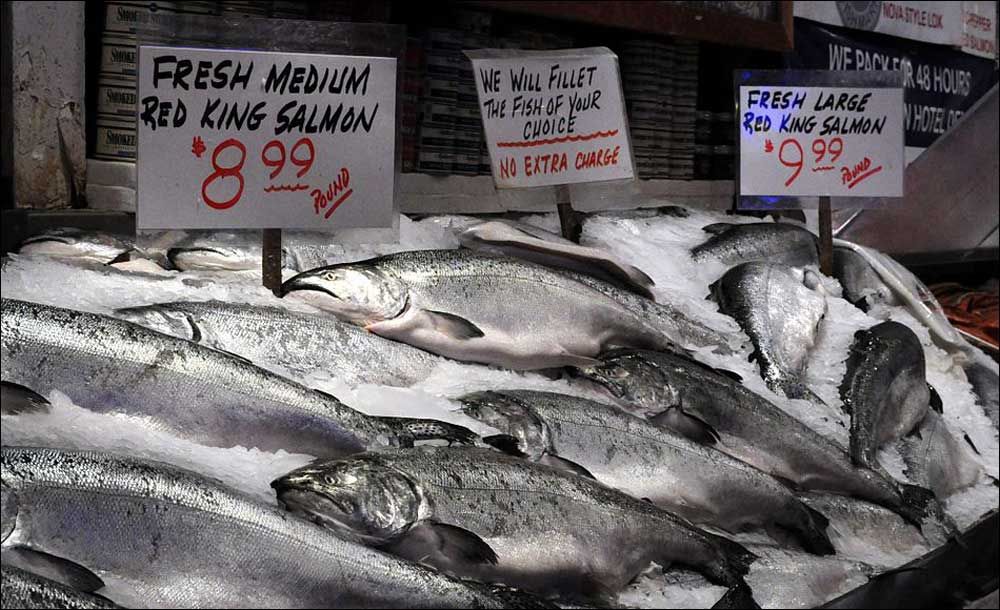
(©Joe Mabel [CC BY-SA (https://creativecommons.org/licenses/by-sa/3.0)]
Here is what might happen to my partner and I on any given day – my partner gets a phone call from a friend who has another friend who works at the salmon farm up the river. A vital piece of machinery has broken down, hundreds of salmon have to be thrown out – they are fresh and perfect but can’t be processed – do we want some?
Do we what? Of course!
Interstitial spaces – the spaces between.
I read this phrase in one of JMG’s essays many years ago. I think it was in response to questions as to how we can possibly live in an ethical and practical manner in the monolithic culture that surrounds us – answer, live in the spaces between, the cracks in the system. This has been my challenge ever since, and continues to challenge me now. There is an infinite variety of ways to go about this project, and it would look different to every person, but here is how it looks for me.
So my partner picks up a couple of dozen large salmon and works until past midnight at his bush property cleaning and gutting them. Then because he is off-grid and doesn’t have a freezer he distributes them among the freezers of his large extended family, trading salmon for freezer space. Every couple of weeks during the year we disinter another salmon for a family dinner, roasting them whole with homegrown lemons and tarragon. At the same time, down in the cottage in town where I live with my daughter I have been given a bucket of apples from a friend’s tree and spend a day piling apple rings into the dehydrator and making apple sauce for the winter.
Usually I might spend a couple of hours writing at my laptop and another hour working in the vegie garden. Maybe I listen to an audio book while I darn socks or patch pants. I suspect that days like this are a normal way of life for Green Wizard folks – they are our bread and butter - but most folks get their bread and butter in two ways – via employment and consumerism. My partner and I try to avoid both.
I live in a small city in Tasmania, an island at the end of the world. I am a divorced single parent with three adult children and one teenager still at home. When I divorced I had three children living with me and my half of the divorce settlement was the family home. I sold our over-large house and bought a tiny cottage with a wild garden which is in walking distance to almost everywhere we need to go. This means we have a paid-off house and a tiny cushion of capital in case of emergencies.
I had a not-very-well-paid job in a large institution and I quit it and started a gardening business because I wanted to do something real and honest and get my hands in the earth. It was very basic – I worked in people’s yards, weeding, pruning, advising on planting out veggie gardens, coming up with organic solutions to all sorts of garden problems. Despite having no gardening qualifications I have been gardening since I was a teenager, so this felt like a natural place for me to be. I didn’t earn a lot, but I loved being out in the weather and interacting with people and gardens. I calmed down a lot, working like that. That was my first space between – making a living without the middle-man.
Next I decided that I wanted to really reduce the burden of consumption I was placing on the earth.
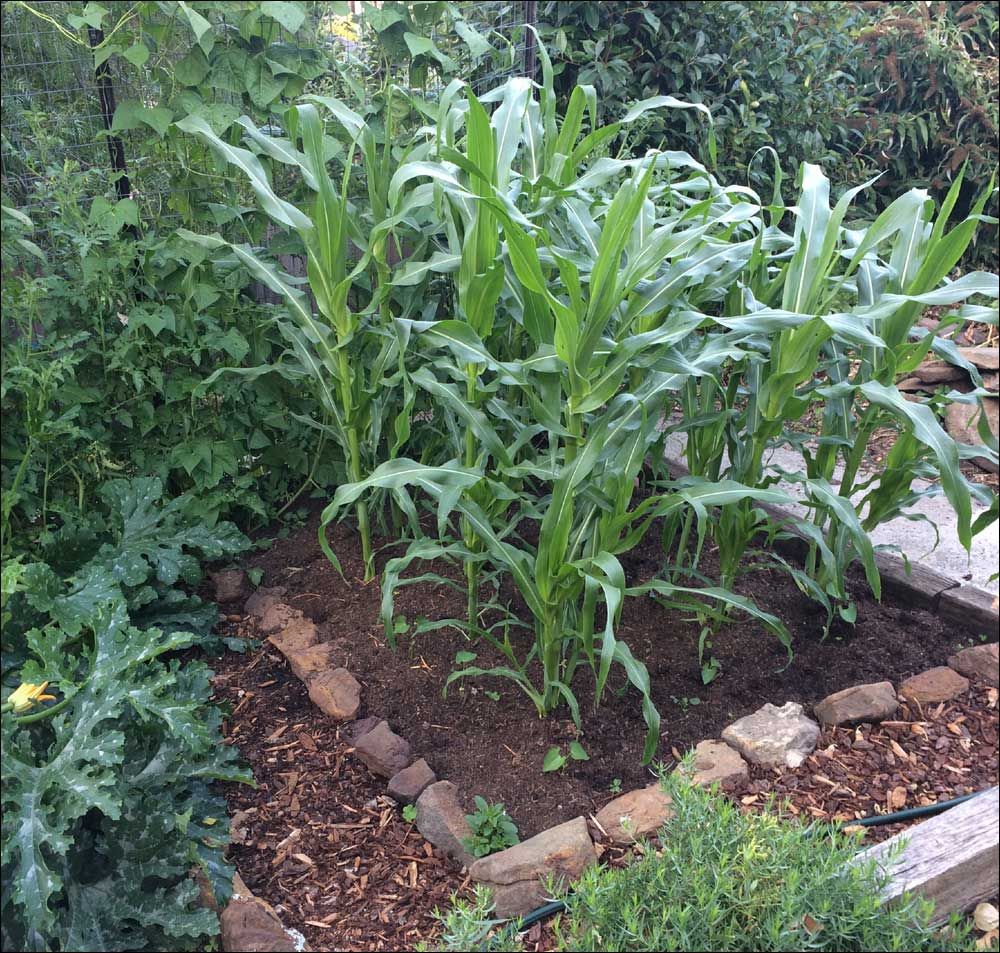
(Blueday Jo © 2019)
Well, I had to, because money was tight, but I decided that I would buy nothing new. I thought this would be difficult, but it turned out to be ridiculously easy. We live in a society that is absolutely swimming in stuff that people are desperate to get rid of so they can go and buy new stuff. I benefit directly from that. I mostly don’t even have to buy things – if people know you will accept all their old stuff they will drop off mountains of it at your front door. My policy is to say yes to everything, then give away anything I don’t need.
One of my children has just left home to go into a share house, and the three of them have furnished an entire house with cast-offs. I don’t buy clothes anymore – I have learned to take in, take up or mend whatever other people hand on to me, not in a professionally tailored manner, but with crazy patching and mending. I look like a bag lady, and I love it. I have no-one to impress.
I hardly even need to buy food. Profligate friends and neighbours clean out their cupboards and freezers because they have bought too much food and hand me their expired dry goods and freezer-burned meat which I pop into the second-hand crock pot that a friend was throwing out.
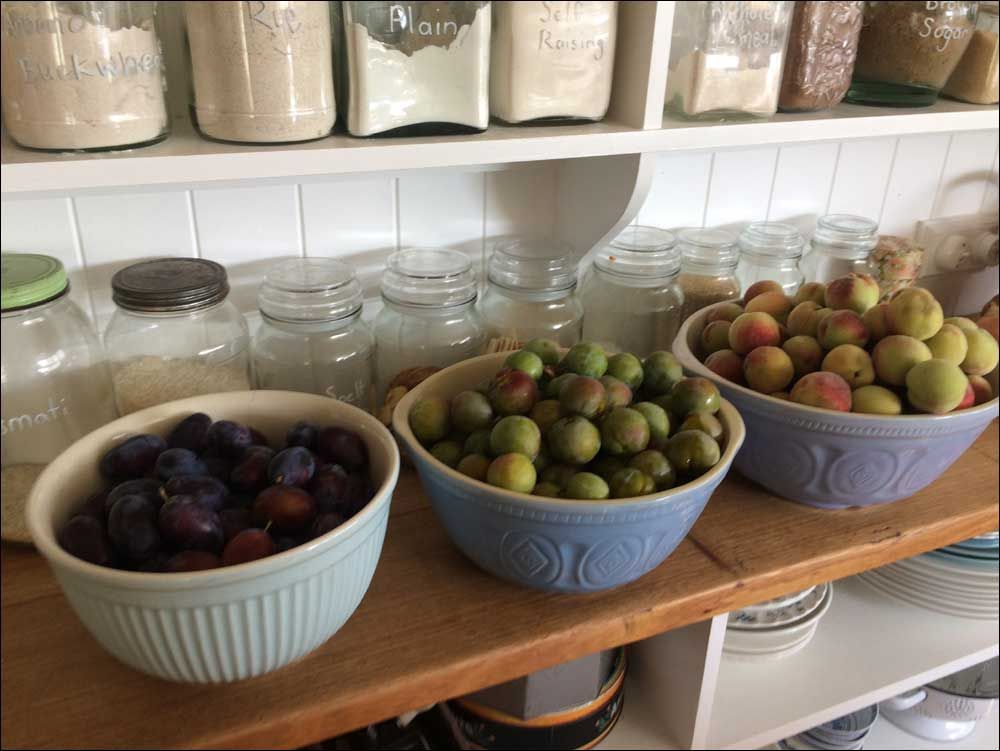
(Blueday Jo © 2019)
That is the second interstitial space that I inhabit – fishing in the waste stream and hauling out treasures.
Next I am learning to be a producer, to cut out the middle-man and provide for my own needs. I garden, of course, and produce lots of food which I preserve. That is improving each year as I get better at succession planting and really read the local conditions. I forage as well – there are lots of abandoned fruit trees growing all over the place, and I am learning how to use plants that often aren’t seen as food – rosehips, hawthorn, finding out which leaves can be used for tea. I am eating a lot of weeds and learning about edible local foods. I have discovered how stupidly easy it is to ferment foods too.
My house is heated with wood and cooled with cross breezes in the summer. I scrounge the wood and cut it at my partner’s bush property. He is even more out of the way of the world than I am. He is a bit of a hermit, has lived in a shed and a shipping container in the bush for over twenty years, and lives completely off-grid with his own creek water, solar panels and a water turbine, and works as a freelance electronics engineer from home. So there is my third interstitial space – making, growing and producing stuff that many people buy.
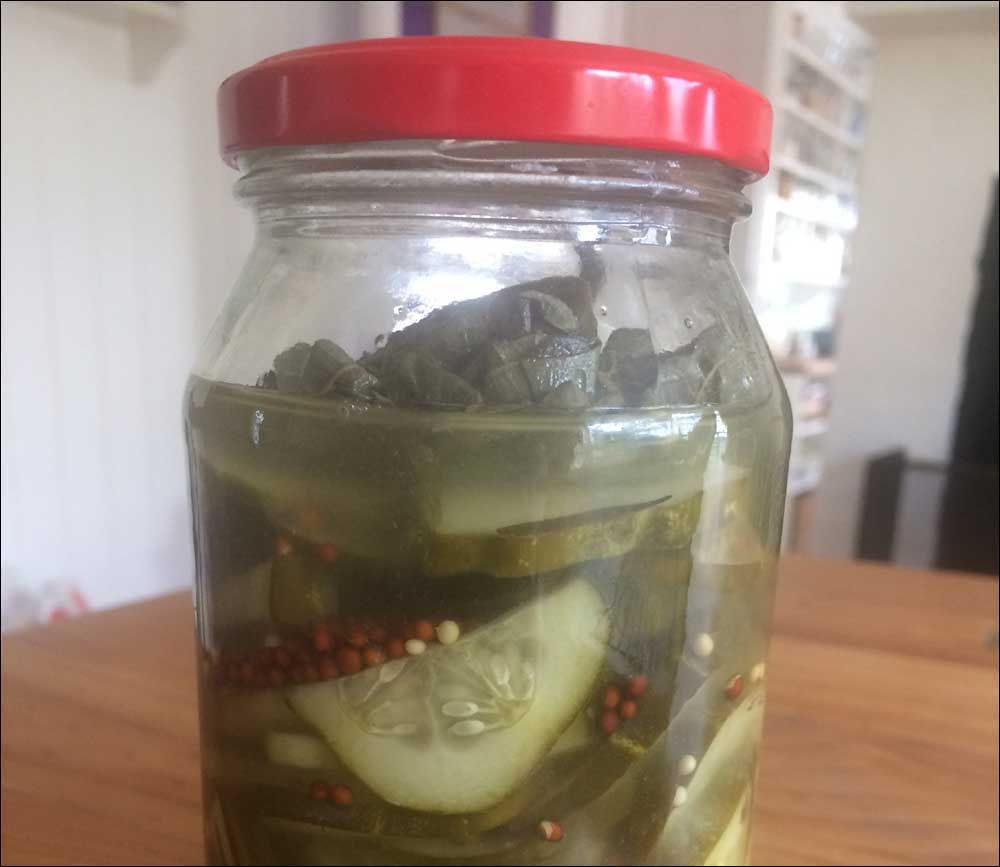
(Blueday Jo © 2019)
Earlier last year I had to have hand surgery, which I have recovered well from, but it is becoming clear that I cannot continue my garden business. I am fit and strong but my hands will not let me continue a lot of manual work. I have given up all my gardens except one, which leaves me an income of $100/week. I have a regular writing gig with an organic gardening magazine, which pays atrociously, and I have written a novel, which may possibly be published – who knows?? That is this year’s adventure.
So I am tightening the belt a little more and waiting to see what happens next. I have a lot of ideas of ways to live with less and maybe make a little more on the side. I have no plans, though, to go back to a ‘normal’ life of being an employee and a consumer. I am determined to stay here in the spaces between, because it’s a way more interesting place than any other I have been in, with extraordinary things I can learn and experience every day and fascinating people to meet and share with.
The places between truly are a carnival of tattered poet farmers, subsistence adventurers and DIY troubadours. Who wouldn’t want to live in company like that?
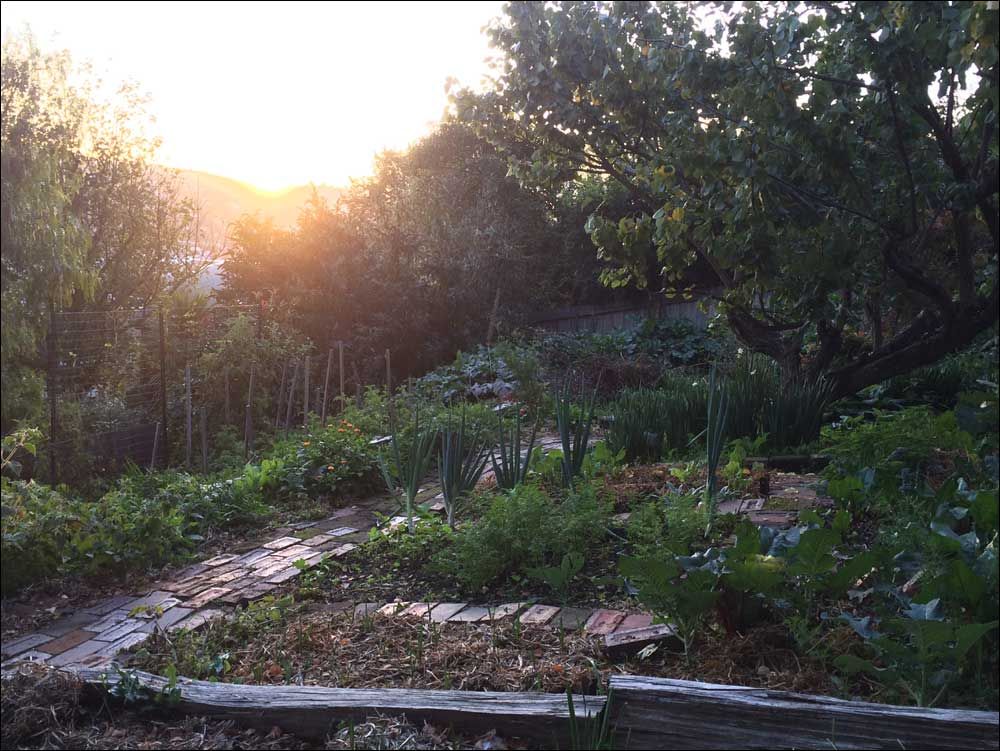
(Blueday Jo © 2019)
---
Visit Blueday Jo's website here: ALL THE BLUE DAY
Comments
David Trammel
Tue, 01/28/2020 - 23:17
Permalink
Love the View
I love the view of that last photo. Is that your backyard. I'm soooooo jealous.
Blueday Jo
Tue, 01/28/2020 - 23:47
Permalink
Yard view
Yes, that's my yard. South west facing slope which is not ideal for a southern hemisphere garden. I contend with too much shade and very little morning sun, but I get great sunsets!
ClareBroommaker
Wed, 01/29/2020 - 14:38
Permalink
This is a lovely glimpse into
This is a lovely glimpse into how you live.
You illustrate that living on the fat that others throw away is so much easier in these times when so many people have so much luxury and, as you say, are always looking to get rid of some of it in order to buy more of it. Building networks of family and associates who exchange with each other is a healthy and historically normal thing to do.
Blueday Jo
Wed, 01/29/2020 - 21:03
Permalink
Gift Economy
Clare, absolutely, and one day there won't be nearly as much of the fat left lying around to be picked up by happy wombles such as myself. In the meantime though, I'll make the most of it. And the gift economy is a central theme in my life, because it builds bonds between people who help each other out, and these are possibly the most important assets I possess..
And I'm so glad to be here with yet another set of knowledgeable people of goodwill:)
alice
Thu, 01/30/2020 - 03:16
Permalink
Great insight Clare and Blueday Jo
Yes, this is brilliant. I have been harvesting and drying willow bark this week and it has struck me how my participation in the gift economy builds community. It makes more real and valuable the interactions with others who understand and appreciate the produce of the land.
Blueday Jo
Thu, 01/30/2020 - 18:03
Permalink
Willow Bark
Alice, I would love to know how you harvest and dry willow bark. Is it for aspirin-style pain relief? How do you use it?
David Trammel
Thu, 01/30/2020 - 20:22
Permalink
Second that Alice
I second Jo's comment. Do you think you could do a short tutorial with some photos? If you can we could put it up as a main page guest blog post. We haven't done any on herbal medicine yet.
alice
Fri, 01/31/2020 - 08:17
Permalink
Have started off
I have started off by putting some notes into the plant area, hope that is helpful.